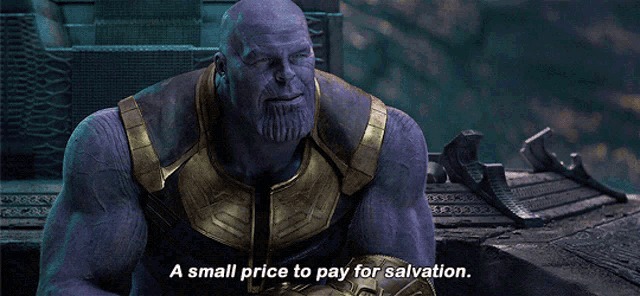Yes, I know it’s hard to entertain the idea that a villain may be right, especially when his intent is to wipe away half of the global population. Nevertheless, this concept has long caused reflection in history and is probably more relevant today than ever.
So, take a little time to ponder what if?
You might find yourself thinking:

The inspiration behind the villain: The history of Malthusianism.
Now that I have your attention, let me introduce you to a theory developed in 1798 by a man called Thomas Robert Malthus appropriately called Malthusianism.
This theory maintains that while the population grows exponentially, our resources grow linearly. This means that eventually, the world population will grow to a point where it will not be able to sustain itself triggering the decimation of a large part of the human population.
Thomas Robert Malthus claimed that while this horrific event would be delayed by technological advances and the birth of the industry sector, (which was being formed in that era with the industrial revolution), it was just as inevitable as Thanos claimed to be.
These ideas were written in his anonymously written book ” An Essay on the Principle of Population as It Affects the Future Improvement of Society”, a book harshly criticised but highly influential in all eras.
In fact, even today his philosophy has maintained its relevancy acquiring a completely new dimension. This is due to the rise in environmental concerns causing an evolution in a new movement that is known as Neo-Malthusianism.
What is Neo-Malthusianism?
Neo-Malthusianism is, as previously mentioned, a movement inspired by the work of Thomas Robert Malthus, which states that the primary solution to the climate crisis is reduction and control of population growth. It differentiates itself from its predecessor for its focus on environmental issues rather than food scarcity and happiness, although these two aspects remain pillars of its philosophy.
The followers of this movement believe that by slowing down population growth, eventually reducing the population on our globe, we will be able to help solve many environmental problems such as:
 Loss of species diversity.
Loss of species diversity.
 Intensive farming.
Intensive farming.
 Overfishing.
Overfishing.
 Depletion of soil.
Depletion of soil.
 Pollution.
Pollution.
 Overconsumption of energy resources.
Overconsumption of energy resources.
The Neo-Malthusianism debate
So, is there any truth to these beliefs? Is Neo-Malthusianism really the way forward? Or is it just a pessimist and cruel theory?
To answer these heavily debated beliefs let’s look at the facts.
The facts about the effect of population growth on the environment
“All these things we talk about wouldn’t be a problem if there was the size of the population that there was 500 years ago.”
These are the words used by primatologist Dame Jane Goodall during a conference held by Population matters in 2020, and while they are somewhat controversial, they may hold some truth.
Sources estimate the population in the 1500s to be between 450 and 500 million people, in 1798, when Thomas Robert Malthus released his book, this number had grown to around 800 million, (although some reports estimate that number to be much higher), while today, 223 years later, this number is almost 10 times larger, with the world population rapidly approaching 8 billion people!
It is therefore undeniable that Thomas Robert Malthus had gotten something right when talking about the exponential growth of the world population, but does it have a toll on the environment?
To answer this all we have to do is look at the average global footprint of a person, which has been estimated in 2014 at 2.8 hectares per person. This means that with the current population in a year we consume the resources of 1.7 earths! If we were to use just the resources of 1 earth, we would have to either reduce our impact to 1.7 hectares per person or alternatively snap our fingers and reduce the population to 4.24 billion people.
This amount is slightly more than half the population today, but more than eight times the population 500 years ago, and more than 5 times the population when Malthusianism was born.
With the population expected to grow to 10 billion within the next 40 years, these stats are worrying and the population panic is easily justifiable.
The problems with Malthusianism
So yes, in many ways Malthusianism is a valid theory and yet it is still highly criticised by many. Journalists such as George Monbiot have classed it as elitist, cruel, and even racist. Why is this? Well, the theory does have many gaps and a lot of the ideas first thought by the creator of the movement have shown to be completely wrong, in fact, opposite.
An example is Thomas Robert Malthus’s thoughts on the relation between wealth, food security, and natality. He hypothesised that the population growth would primarily come from rich countries which in the present is completely wrong, as natality is at its highest among poor countries. Not to mention that these countries where poverty and natality are high are the least impactful on the environment and on the world in general. Finally, attempts made by China and India to reduce population growth have been shown to be counterproductive not to mention against basic human rights.
So, what is the solution to this problem? Ironically financing poor countries would be a big step in reducing population growth as well as giving them access to proper contraceptives. This though could also enlarge their impact, so the solution is not as easy as Malthusians would make you think.
So…was Thanos right?
It is hard to make definite conclusions as the issue is complex.
While it is undeniable that halving the population would have a positive impact on the environment, at the same time our version of Thanos Neo-Malthusianism would not be able to have the same impact.
Reducing the population significantly would take a long time and as the population gets richer no results would be guaranteed. While population control must be considered for the future of our planet it is not one solution that is going to save us from an environmental catastrophe. In fact, this controversial theory can feel at times as an avoidance to better ourselves and our environmental impact.
In conclusion, Thanos may have had a point, but in my humble opinion in our current situation, we should concentrate more on preserving and properly using our resources rather than the extent of the world population.
After all, it is all about balance.





